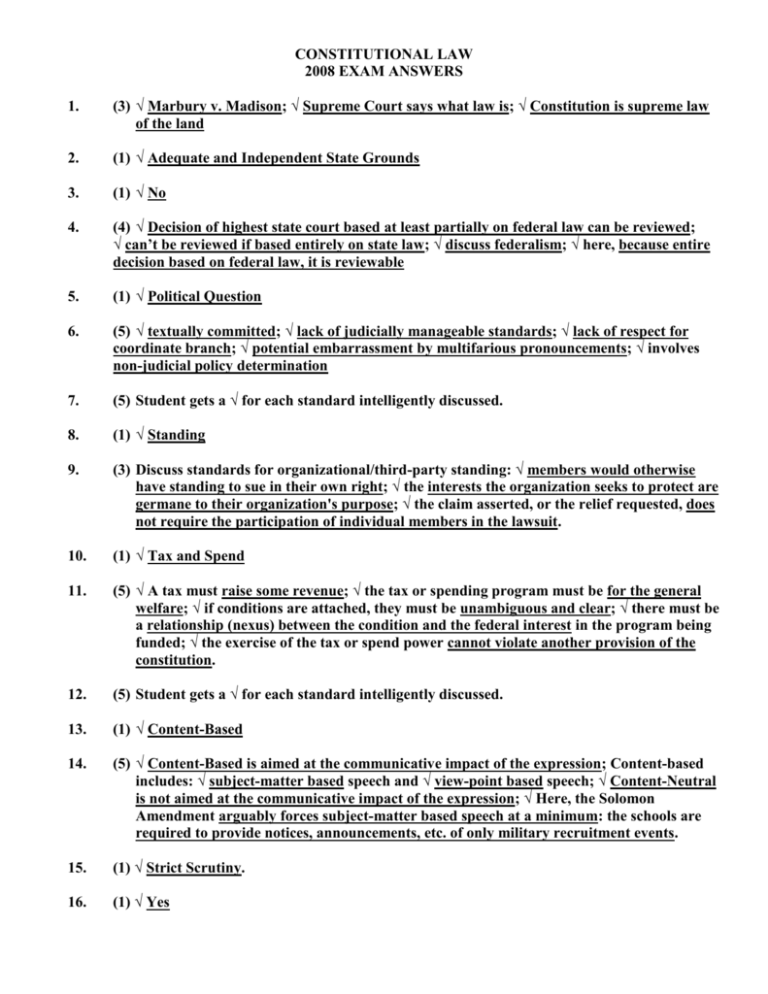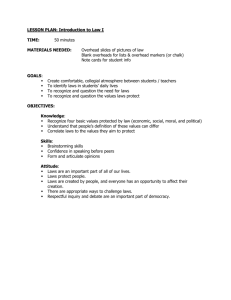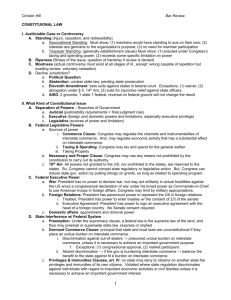Final Exam 2008 ANSWERS - Massachusetts School of Law
advertisement

CONSTITUTIONAL LAW 2008 EXAM ANSWERS 1. (3) √ Marbury v. Madison; √ Supreme Court says what law is; √ Constitution is supreme law of the land 2. (1) √ Adequate and Independent State Grounds 3. (1) √ No 4. (4) √ Decision of highest state court based at least partially on federal law can be reviewed; √ can’t be reviewed if based entirely on state law; √ discuss federalism; √ here, because entire decision based on federal law, it is reviewable 5. (1) √ Political Question 6. (5) √ textually committed; √ lack of judicially manageable standards; √ lack of respect for coordinate branch; √ potential embarrassment by multifarious pronouncements; √ involves non-judicial policy determination 7. (5) Student gets a √ for each standard intelligently discussed. 8. (1) √ Standing 9. (3) Discuss standards for organizational/third-party standing: √ members would otherwise have standing to sue in their own right; √ the interests the organization seeks to protect are germane to their organization's purpose; √ the claim asserted, or the relief requested, does not require the participation of individual members in the lawsuit. 10. (1) √ Tax and Spend 11. (5) √ A tax must raise some revenue; √ the tax or spending program must be for the general welfare; √ if conditions are attached, they must be unambiguous and clear; √ there must be a relationship (nexus) between the condition and the federal interest in the program being funded; √ the exercise of the tax or spend power cannot violate another provision of the constitution. 12. (5) Student gets a √ for each standard intelligently discussed. 13. (1) √ Content-Based 14. (5) √ Content-Based is aimed at the communicative impact of the expression; Content-based includes: √ subject-matter based speech and √ view-point based speech; √ Content-Neutral is not aimed at the communicative impact of the expression; √ Here, the Solomon Amendment arguably forces subject-matter based speech at a minimum: the schools are required to provide notices, announcements, etc. of only military recruitment events. 15. (1) √ Strict Scrutiny. 16. (1) √ Yes 17. (4) √ Compelling a person to say something s/he is opposed to violates the First Amendment just as much as preventing a person to express what s/he believes; √ the object of 1st Amendment is to place individuals’ political and religious beliefs beyond the reach of the majority; √ Freedom of speech, freedom of press, freedom of assembly, and freedom of worship are susceptible of restriction only to prevent grave and immediate danger to interests which the state may lawfully protect. √ This is similar to the flag burning case – West Virginia Bd. Of Educ. v. Barnette – which protected a student’s right not to salute the flag. 18. (1) √ Department of Defense 19. (3) √ Noticing military recruitment events is a far cry from the compelled speech in Barnette; √ the Solomon Amendment does not dictate the content of speech, it only requires equal access to facilities; √ there is no pledge or motto that must be recited like in Barnette. 20. (1) √ 11th Amendment Immunity 21. (6) √ The 11th Amendment √ bars suits by citizens of a state against their own state or another State; √ but there are exceptions: √ States may consent and waive their right not to be sued by a citizen (√ such consent must be unmistakably clear and will not be implied from silence or acquiescence); √ Private citizens may sue state officials in their individual capacities (√ unless the suit names an individual but is seeking compensation directly our of the state treasury); √ If Congress has created such an action under § 5 of the 14th Amendment (historical discrimination involving race, national origin, gender or a fundamental right). 22. (5) √ None apply; √ The only applicable exception is under § 5 of the 14th Amendment; √ there is no evidence that Congress created such an action; √ discrimination in regard to interest rates is not historical discrimination and √ does not involve race, national origin, gender or a fundamental right. 23. (1) √ Dormant Commerce Clause 24. (4) √ Strict Scrutiny/Per Se Scrutiny if √ the law discriminates against out-of-staters on its face; √ the Pike Balancing Test (√ asks whether the law is clearly excessive in relation to the putative local benefits) if the law is facially neutral and is said to discriminate against outof-staters in effect; √ here, the law appears to discriminate against out-of-staters on its face by clearly making only residents free from taxation 25. (2) √ The Farrells will not prevail because √ the State of Kentucky has entered the marketplace in selling bonds, and will be entirely exempt of the Dormant Commerce Clause under the “market participant” exception. 26. (3) √ Strict Scrutiny; √ Intermediate/Middle-Tier Scrutiny; √ Rational Basis 27. (3) Student gets a √ for each standard intelligently discussed. 28. (1) √ Strict Scrutiny 29. (1) √ The Government 30. (1) √ No 2 31. (6) √ Under the Washington v. Davis rule, strict scrutiny does not apply when √ the plaintiff can only show that “the effect” of the law discriminates on the basis of race; √ Strict scrutiny does not apply if the plaintiff cannot show racial motivation/intent; √ here, the facts are clear that the plaintiffs’ claim is limited to the effect, not the motivation, of the law; √ rational basis applies and the government need only assert a legitimate, conceivable justification; √ under rational basis the plaintiff rarely wins. 32. (3) √ Injury in fact; √ Causation; √ Redressability. 33. (6) √ This involves “prudential” standing rather than “constitutional” standing; √ Third-Party Standing (a form or prudential standing) is allowed when √ there is a close relationship between the plaintiff and the absent party, and √ there is a hardship (cost, embarrassment of going public, etc.) preventing the absent party from suing himself/herself; √ here, the doctorpatient relationship is close enough to justify third-party standing; and √ one might argue that the plaintiff either lacked the funds or was too embarrassed by the publicity to engage in a public suit. 34. (1) √ YES or NO is correct because Roe v. Wade classified the right to an abortion as a fundamental right under the right of privacy; however, in Casey the Supreme Court seems to have (without expressly stating) that the fundamental right/privacy analysis was replaced by the “undue burden” test (which seems something less than a fundamental rights analysis). 35. (5) √ Right to Privacy; √ Penumbra/Bill of Rights/9th Amendment; √ control of one’s body is fundamentally a right of privacy; √ undue burden; √ restrictions that make abortion difficult or impractical 36. (1) √ Undue Burden 37. (1) √ Strict Scrutiny 38. (1) √ Commerce Clause or 10th Amendment 39. (3) √ Channels of commerce; √ Instrumentalities of commerce; √ Substantially affects commerce. 40. (3) √ Just like in Lopez and Morrison, √ possession of explosives (like firearms) is a purely local crime that doesn’t involve interstate commerce; √ the principles of federalism are better served under the 10th Amendment if state criminal laws deal with the matter. 41. (3) √ Unlike Lopez, which involved crimes limited to local school zones, this statute involved explosives shipped in interstate commerce; √ the fact that Disney was a longshoreman demonstrated that the explosives probably arrived, and were intended to leave, through interstate commerce; √ this conduct clearly “substantially affects” interstate commerce. 42. (6) √ By stating that Congress is given the power to “make all Laws which shall be necessary and proper for carrying into Execution the foregoing Powers,” √ Art. I, § 8 acts to expand Congress’s authority to act merely perform √ enumerated powers. √ It may do everything necessary to carry out the intent of the enumerated powers. √ It should be noted that the 3 necessary and proper clause is a “derivative” power clause; √ it does not create power on its own, but merely expands the powers enumerated in the Constitution. 43. (1) √ The State Action Doctrine 44. (4) √ The public function exception, which is √ the exercise by a private entity of powers traditionally exclusively reserved to the State ; √ the entanglement exception, which is when √ the government affirmatively authorizes, encourages or facilitates private conduct that violates the Constitution. 45. (4) √ Time Warner was not exercising a public function because √ the provision of cable services is not a function traditionally exclusively reserved to the state; √ the entanglement exception doesn’t apply because √ the mere licensing or regulating of a private activity is not enough to create entanglement (Moose Lodge and Jackson cases). 46. (1) √ Preemption. I’ll also take √ Mootness because of the sentence stating that the misreporting was corrected (please note, however, that this is a much weaker answer because damages for breach of contract, negligence and misrepresentation may still be collectable). 47. (6) √ Express Preemption: √ Congress adds words to the law that specifically preempt state law; √ Implied Preemption includes 3 types: √ Conflict Preemption – impossible to comply with both state and federal law; √ Conflict Preemption can also result when, although it is possible to comply with both state and federal law, the state law interferes with one of the goals or objectives of the federal law; √ Field Preemption occurs when the federal law is so pervasive and/or extensive, that Congress must have intended to occupy the entire field and leave no room for the state. 48. (2) Student gets a √ for each standard intelligently discussed. It sounds like a good case for Field Preemption or a claim that state law suits would interfere with the goals or objectives of the federal law. 49. (6) √ Physical Occupation: √ the government trespasses or physically occupies private property; √ Total Economic Deprivation: √ a governmental regulation prevents the property owner from using the property for any meaningful economic benefit; √ Regulatory Taking: √ a government law that goes too far. 50. (2) √ This appears to be a physical occupation because the Border Patrol is actually using Wick’s land. √ This is a “per se” or “categorical” taking and √ the only question is how much compensation should be paid. TOTAL POINTS: 144 4








